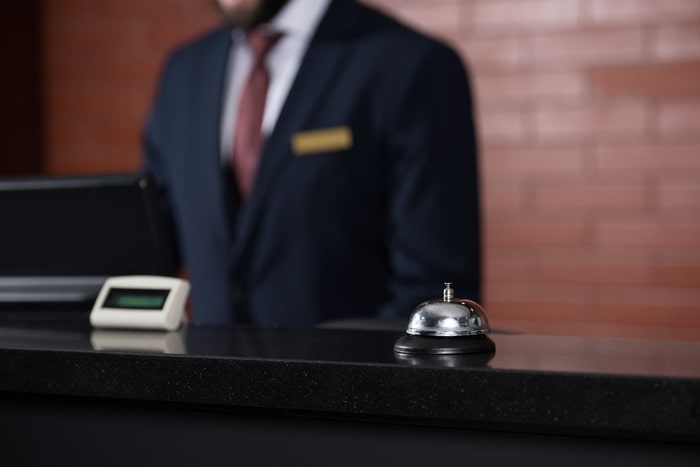
- August 8, 2023
- |security guard company
- | 0
Safeguarding Precious Possessions –
In the realm of hospitality, ensuring the security of guest valuables and belongings is a top priority. As a distinguished hotel security company, XPressGuards understands the significance of providing guests with peace of mind when it comes to protecting their cherished possessions. This article delves into the intricate strategies, technologies, and protocols that hotels employ to safeguard guest valuables within their premises, fostering a sense of trust and comfort during their stay.
1. In-Room Safes
One of the most common and effective ways to protect guest valuables is by providing in-room safes. These safes are securely bolted to a fixed surface within the room, making them an ideal place for guests to store items such as passports, cash, jewelry, and electronics. In-room safes are typically programmed with personal codes chosen by guests, ensuring that only they have access to their stored belongings.
2. Electronic Locks and Keycard Systems
Modern hotels utilize electronic locks and keycard systems not only for guest room access but also to secure personal storage spaces. Some hotels offer lockers or secure storage rooms for guests to use during their stay. Electronic lockers can be accessed using the same keycard provided for guest room entry, adding an extra layer of convenience and security.
3. Guest Identification and Verification
Hotels prioritize guest safety by implementing stringent identification and verification procedures. Guests are required to present valid photo identification and the credit card used for booking during check-in. This process ensures that individuals accessing guest rooms or personal storage areas are authorized and match the reservation details, minimizing the risk of unauthorized access.
4. Privacy and Discretion
Hotels prioritize guest privacy and discretion when it comes to handling their valuables. Guests often prefer to keep their personal belongings confidential, and hotel staff are trained to respect this privacy. Whether it’s storing items in an in-room safe or requesting assistance with accessing personal storage, guests can trust that their valuables will be handled discreetly and professionally.
5. Guestroom Security
The physical security of guestrooms plays a significant role in protecting guest valuables. Reinforced door frames, secure locks, and peepholes enhance the overall security of the room. Hotel staff are trained to assist guests with securing their rooms upon departure, ensuring that doors are properly locked and any valuables are appropriately stored.
6. Surveillance and Security Personnel
Surveillance cameras positioned in public areas, hallways, and entrances provide an additional layer of security for guest valuables. Trained security personnel monitor these cameras to detect and deter any suspicious activities. The presence of security staff in common areas and near entrances can discourage potential thieves and contribute to a secure environment.
7. Digital Room Management Systems
Digital room management systems enable hotels to track and manage room access in real time. These systems can extend to managing secure storage areas, allowing staff to log when a guest accesses their personal belongings. This not only enhances security but also provides a record of interactions with guest valuables.
8. Limited Access to Staff
Hotel staff members are granted limited access to guest rooms, focusing primarily on housekeeping and maintenance tasks. Access is typically controlled through electronic keycard systems that log staff entry and exit times. This limited access helps ensure that only authorized personnel enter guest rooms, reducing the potential for unauthorized access to guest valuables.
9. Guest Education and Communication
Hotels prioritize guest education by providing information about the available security measures. In-room materials, such as guest directories or informational brochures, can inform guests about the presence of in-room safes, secure storage options, and the importance of keeping their valuables protected. Transparent communication enhances guests’ confidence in the hotel’s commitment to their security.
10. Emergency Response Plans
In the event of emergencies or unforeseen incidents, hotels have established protocols for guest safety and property protection. These plans cover scenarios such as fires, natural disasters, and security breaches. Adequate emergency planning ensures that guests’ valuables are accounted for and protected during challenging situations.
11. Collaboration with Local Law Enforcement
Hotels often collaborate with local law enforcement agencies to enhance security and response capabilities. Establishing a relationship with law enforcement ensures that authorities can respond promptly to incidents involving guest valuables, theft, or unauthorized access. This collaboration further reinforces the commitment to guest safety.
12. Continuous Improvement
The pursuit of guest valuables protection is an ongoing effort. Hotels regularly evaluate and enhance their security measures based on industry best practices, technological advancements, and guest feedback. This commitment to continuous improvement ensures that guest valuables remain safeguarded and that the hotel maintains its reputation for providing a secure environment.
Safeguarding guest valuables and belongings within hotel premises is a cornerstone of exceptional hospitality. By deploying a combination of secure storage options, electronic lock systems, trained staff, and advanced surveillance technology, hotels create an environment where guests can trust that their cherished possessions are well-protected.
As a respected hotel security company, XPressGuards is dedicated to partnering with hotels to ensure the highest standards of guest valuables protection, contributing to a seamless and secure guest experience. Contact us to learn more about our security guard services.


